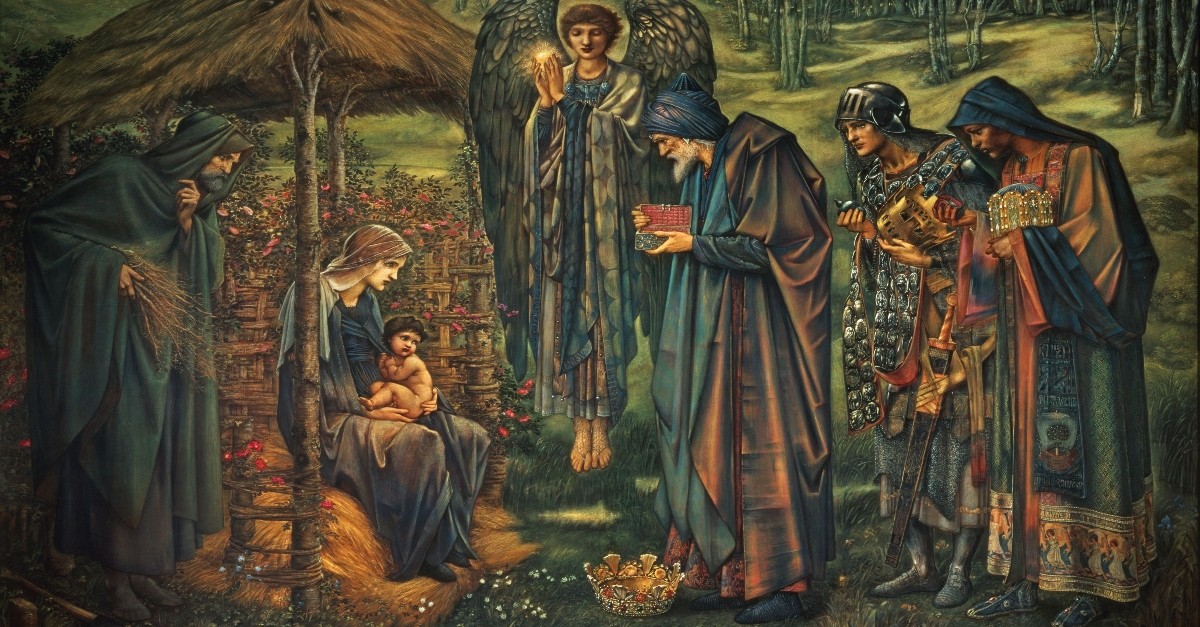
Saturnalia was an ancient Roman festival dedicated to the Roman God Saturn. Saturn is the Roman equivalent of Kronos, father of deities like Jupiter, Neptune, Venus, and Mars. Saturn was a god of agriculture, and Romans celebrated Saturnalia by giving gifts, feasting, gambling, and reversing social norms. Some believe modern Christmas traditions come from Pagan customs because some of them are similar to how we celebrate Christmas today. So, they reason, Christians may have adopted them. However, the truth is that Saturnalia in Roman times symbolized a desire to return to a golden age of the past.
Lucian, a Roman historian, said Saturania was a "festive season, when 'tis lawful to be drunken, and slaves have license to revile their lords." This does not sound like a Christian festival, but some elements are similar. Feasting, gift-giving, and candle-lighting formed a large part of Saturnalia celebrations.
Feasting was important because Saturn was an agricultural god, who blessed the crops.
Gift-giving formed an integral part of the Saturnalia celebration as well. People gave gifts on the last day of Saturnalia, December 23. Typically, these were wax figurines that represented the human sacrifice that Saturn required. However, by the first century AD, Saturn accepted gladiators who died in combat as human sacrifices.
Photo Credit: ©iStock/Getty Images Plus/1carson2

When Was Saturnalia Celebrated?
Saturnalia is connected with the beginning of the star sign Capricorn in the Greco-Roman Zodiac. It began on December 17 and concluded on December 23. Roman philosopher Porphyry said that is when the sun enters Capricorn, Saturn's celestial home.
Later, the closeness of Saturnalia to the winter solstice led people to see this time of year as the sun's victory. This coincided with a later Roman holiday, Sol Invictus (the Unconquered Sun). Historians of religion say Christians co-opted this festival with Christmas. The Chronograph of 354 is the first document to include mention of both the date of Christmas and the date of Sol Invictus.
Photo credit: ©GettyImages/ipopba

Is Saturnalia Related to Christmas?
The overlap between Christmas and Saturnalia has been overstated by modern scholars. This is largely due to the field known as “history of religions.” This field asserts that all religions have a common origin and are all man-made. The overlap and confusion between Saturnalia and Christmas comes in part because both occur in the latter half of December, and discuss how light overcame darkness. The atheist scholars also point to the similarities between them to indicate that Christians simply co-opted the traditions of the Roman empire into their festivals. The overlap is there, but this wasn't due to the Catholic Church making a power play to steal the Pagan traditions.
Practices like gift-giving and feasting show there is some overlap, but many other holidays incorporate these as well as Christmas. Unlike Saturnalia which honored a pagan deity, Christmas is fundamentally a Christian celebration of Jesus’ birth, distinct in its focus on worshiping Christ rather than pagan practices.
Photo credit: ©GettyImages/Anna Ostanina

Did Christians Borrow Traditions from Saturnalia?
Saturnalia does have traditions similar to Christmas, but from our modern point of view it is an assumption to say they were borrowed directly from Saturnalia. Role reversal and debauchery form an interesting case that Christians borrowed these from the Romans. A French Cleric explained the excising of vice in this way.
“We do these things in jest and not in earnest, as the ancient custom is, so that once a year the foolishness innate in us can come out and evaporate. Don’t wineskins and barrels burst open very often if the air-hole is not opened from time to time? We too are old barrels”
This Catholic church priests, like much of Europe at this time, saw certain times of the year as times when the order of things should be reversed. People should simply enjoy themselves for a short time in order to burn off the pressure of performance that dominated the spiritual life of Medieval Christians. The fewer sins one commits, the less time one would spend in purgatory, it was believed at the time. Festivals like Saturnalia provided a license to do raucous things for a short time.
Another pressure valve in Rome and the Middle Ages was the inversion of social norms. One popular tradition was the Lord of Misrule which took place around Christmas. A lower-class person would then set rules, often promoting wild parties. These practices, however, seem un-Christian. They contradict the call to avoid excess and debauchery.
Many of these reversal traditions stopped during the Protestant Reformation when the focus shifted back to the Word of God, not ancient Pagan traditions. However, in many cases, people of the time threw the baby Jesus out with the Pagan tradition bathwater because there was nothing about Christmas festivities in the Bible. In 1647, Oliver Cromwell, the leader of the UK after the English Civil War, banned Christmas celebrations altogether. The people responded by widespread rebellion, because the people cherished Christmas traditions and celebrations.
Photo credit: ©Unsplash/Mike Blank

What Should Christians Know about the Origins of Christmas?
Christians have celebrated Christmas on or around December 25 for at least 1700 years. Many atheist scholars claim that Christians adopted the date of Christmas to coincide with Sol Invictus, another Roman festival. However, these claims are dubious at best. The first mention of Sol Invictus and the first recording of Christmas on December 25 occur in the same calendar. This is from 375, so after Rome became a Christian empire. Yet, Sol Invictus likely wasn’t celebrated until Christianity was well-established.
Some early Christians believed December 25 was a fitting date for Jesus' birth because it was exactly nine months after Passover, the time of His crucifixion. In their view, this meant Jesus died on His 33rd birthday, reflecting an ancient idea that holy people died on the anniversary of their conception. This theory suggests that the date for Christmas may have been influenced by the desire to align Christian traditions with existing societal customs, making the observance more familiar and acceptable in a culture resistant to change.
One important Christmas tradition was the period between December 25 and January 6 (Epiphany), known as the twelve days of Christmas. It became one of the main celebrations of Christianity. This was a period of rest, reflection, and revelry. The practice began in 567 through the Council of Tours, which declared the period between December 25 and January 6 as a holy period of time. These festivities occurred nearly a week after Saturnalia, showing that early Christians didn’t simply replicate Roman traditions when celebrating Christmas. Instead, Christmas traditions serve as powerful reminders of the profound truth that Jesus came to earth to redeem humanity and bring us hope.
Photo credit: ©Unsplash/Annie Spratt

What Can We Learn from the History of Saturnalia and Christmas?
Saturnalia and Christmas both include feasts, gift-giving, and times of rest, but the motivation behind them is different. Some Christians will celebrate Christmas to remember Christ's birth. Others will not, due to its association with Pagan traditions. As Colossians 2:16 says, “Therefore let no one pass judgment on you in questions of food and drink, or with regard to a festival or a new moon or a Sabbath.” So it is not for us to judge those who don’t celebrate Christmas; it is a matter of conscience. If someone finds the relation between Christmas and Saturnalia objectionable, they should not celebrate it. If others see Christmas as a way of commemorating the birth of Christ, then they should celebrate it.
The important thing to remember about Christmas is that it commemorates the birth of our Lord and Savior. Christmas should remind us that God became flesh. The food, family time, and gifts are not the main point of Christmas. If they become the ultimate thing, then we have lost the meaning of Christmas, and we risk making it as much a pagan celebration as Saturnalia.
Photo credit: ©Unsplash
Ben Reichert works with college students in New Zealand. He graduated from Iowa State in 2019 with degrees in Bioinformatics and Computational Biology, and agronomy. He is passionate about church history, theology, and having people walk with Jesus. When not working or writing you can find him running or hiking in the beautiful New Zealand Bush.
Originally published Saturday, 14 December 2024.
